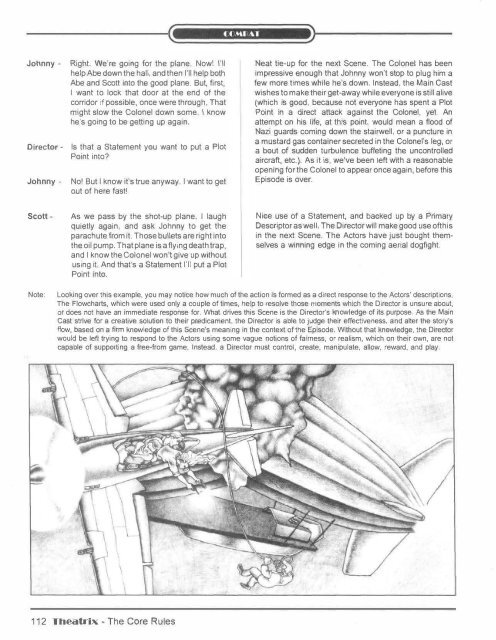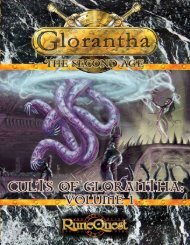Untitled - Index of - Free
Untitled - Index of - Free
Untitled - Index of - Free
You also want an ePaper? Increase the reach of your titles
YUMPU automatically turns print PDFs into web optimized ePapers that Google loves.
Johnny - Right. We're gomg for the plane. Now! I'll<br />
help Abe down the hall, and then I'll help both<br />
Abe and Scott into the good plane. But, first,<br />
I want to lock that door at the end <strong>of</strong> the<br />
corridor if possible, once were through. That<br />
might slow the Colonel down some. I know<br />
he's going to be getting up again.<br />
Director- Is that a Statement you want to put a Plot<br />
Point into?<br />
Johnny - No! But I know it's true anyway. I want to get<br />
out <strong>of</strong> here fast!<br />
Scott- As we pass by the shot-up plane, I laugh<br />
quietly again, and ask Johnny to get the<br />
parachute from it. Those bullets are right into<br />
the oil pump. That plane is a flying death trap,<br />
and I know the Colonel won't give up without<br />
using it. And that's a Statement I'll put a Plot<br />
Point into.<br />
Neat tie-up for the next Scene. The Colonel has been<br />
impressive enough that Johnny won't stop to plug him a<br />
few more times while he's down. Instead, the Main Cast<br />
wishes to make their get-away while everyone is still alive<br />
(which is good, because not everyone has spent a Plot<br />
Point in a direct attack against the Colonel, yet An<br />
attempt on his life, at this point, would mean a flood <strong>of</strong><br />
Nazi guards coming down the stairwell, or a puncture in<br />
a mustard gas container secreted in the Colonel's leg, or<br />
a bout <strong>of</strong> sudden turbulence buffeting the uncontrolled<br />
aircraft, etc.). As it is, we've been left with a reasonable<br />
opening for the Colonel to appear once again, before this<br />
Episode is over.<br />
Nice use <strong>of</strong> a Statement, and backed up by a Primary<br />
Descriptor as well. The Director will make good use <strong>of</strong>this<br />
in the next Scene. The Actors have just bought them<br />
selves a winning edge in the coming aerial dogfight.<br />
Note: Looking over this example, you may notice how much <strong>of</strong> the action is formed as a direct response to the Actors' descriptions.<br />
The Flowcharts, which were used only a couple <strong>of</strong> times, help to resolve those moments which the Director is unsure about,<br />
or does not have an immediate response for. What drives this Scene is the Director's kn owledge <strong>of</strong> its purpose. As the Main<br />
Cast strive for a creative solution to their predicament, the Director is able to judge their effectiveness, and alter the story's<br />
flow, based on a firm knowledge <strong>of</strong> this Scene's meaning in the context <strong>of</strong> the Episode. Without that knowledge, the Director<br />
would be left trying to respond to the Actors using some vague notions <strong>of</strong> fa1rness, or realism, which on their own, are not<br />
capable <strong>of</strong> supporting a free-from game. Instead, a Director must control, create, manipulate, allow, reward, and play.<br />
112 Theatrix - The Core Rules



